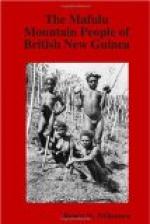2. Agreement.
The adjective always follows the noun which it qualifies, and takes the suffix of the noun.
Ex. a sesada, fence long; emo gai, house old; kodige kisiakatsi, plate little-in: indiv’ amoja(le) knife blunt-with; koua baibitu, box big-on.
Sometimes the pronoun u(ne), his, is placed between the noun and the adjective.
The meaning of this is uncertain, but it appears to be more emphatic, as e.g. “the road which is good,” “the house which is bad.”
Ex, enamb’ un’ ifa, the good road, em’ u koi, the bad house.
The adjective used as predicate immediately follows the noun, without a substantive verb.
Ex. an’ ala gududuba, that man (is) stingy; nuni sesada, thou (art) tall; amu safali, the women (are) weak.
Note.—When the subject is represented by a pronoun of the first or second person dual or plural, the predicate remains singular.
Ex. dini kakava(ne) we (are) strong; yani kapape, you two (are) weak; but, muni isosongai, they (are) idle.
When the predicate expresses a negation the word expressing the quality is followed by the adverb ua(ne) not.
Ex. sesad’ ua, onov’ aka, it is not long, it is short.
3. Comparison.
There is no special form for comparisons. Two positive statements are made, or a superlative may be used.
Ex. My house is larger than yours may be translated: naul’ e baibe, nul’ a kisiaka, my house is large, yours is small, or nul’e baibe, naul’a baibe ta, your house is large, mine is large much.
Equality is expressed by the suffix _-umba_ or _-yakala._
Ex. naul’ e, nul’ em’ umba, my house is like your house; nuni sesada, nauyekala, you are tall like me.
A superlative is expressed by the prefix ande, or the suffix _-ta._ But if the adjective in the superlative expresses a lessening of the quality then _-aka(ne)_ is suffixed.
Ex. baibe, large, ande baibe, larger; ifa, fine, ifata, finer; but ono(ve), short, onov’aka, shorter.
The prefix ande is used only with adjectives which express an idea of extension.
When the adjective expresses an actual state rather than a passive, it is preceded by the sign of past tense, the particle ga.
Ex. ant g’ifa, the breeches are (have become) good; ena ga ko, the road (is) bad.
III. Demonstrative Adjectives.
The demonstrative adjectives in Fuyuge are represented by the suffixes -ana, this, -ala, this, here, -vala that, there. The same expressions translate the French “le voici,” “le voila.”
Ex. indiv’ana, this knife; eni’ala, this house; enavala, that road.




